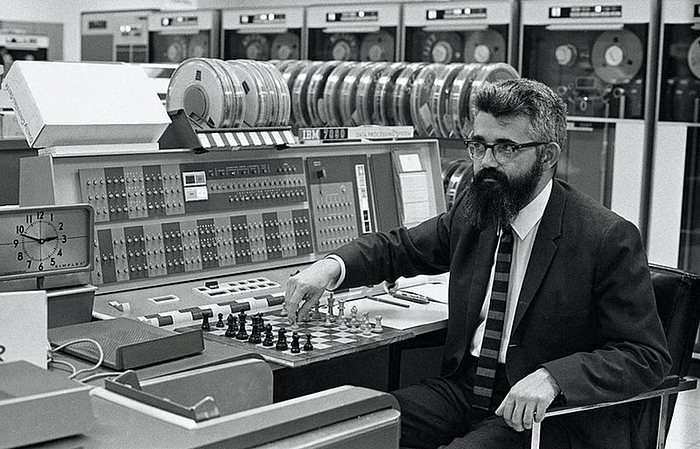Table Of Contents
John McCarthy ‘s Background and Education
John McCarthy was born on September 4, 1927 in Boston, Massachusetts. Raised in a modest family, his father worked as a construction worker and his mother was a teacher. From a young age, McCarthy showed a great interest in mathematics and science, which led him to excel in his studies. At a young age, his family moved to Los Angeles, where he attended a local high school and demonstrated remarkable proficiency in scientific subjects.
After graduating from high school, McCarthy enrolled at the California Institute of Technology (Caltech), where he received a bachelor’s degree in mathematics in 1948. He then moved to Princeton University, where he obtained a Ph.D. in mathematics in 1951. During his time at Princeton, McCarthy was influenced by the works of Alan Turing and Norbert Wiener, sparking his interest in the field of computing and artificial intelligence.
John McCarthy: His Contributions to Advancing Artificial Intelligence
John McCarthy’s contributions to advancing artificial intelligence are among the most significant in this field. In 1956, McCarthy organized the famous Dartmouth Conference, considered the official starting point for the field of artificial intelligence. During this conference, the term “artificial intelligence” was introduced for the first time, laying the theoretical and practical foundations for this new field.
Among his notable contributions is the development of the concept of “Time-sharing,” which allowed multiple users to access the same computer simultaneously. This innovation had a significant impact on the development of modern computing, enabling users to utilize computer resources more efficiently.
McCarthy also presented numerous theoretical researches that contributed to the development of algorithms and mathematical models used in artificial intelligence. Among these research works is the development of the concept of “Mathematical Logic” and its application in designing intelligent systems.
Invention of the LISP Programming Language
The LISP programming language is considered one of John McCarthy’s most important achievements. This language was developed in the late 1950s with the aim of providing a powerful and flexible tool for developing intelligent systems. LISP is one of the oldest programming languages still in use today, widely used in the fields of artificial intelligence and scientific research.
LISP was designed to be a list-based programming language, making it ideal for handling complex data and data structures. It supports functional programming, allowing programmers to write more efficient and flexible programs. Thanks to these features, LISP has become the preferred language for many researchers and developers in the field of artificial intelligence.
Among the famous applications developed using LISP is the medical system “Mycin,” considered one of the first expert systems in the field of medicine. This system was able to diagnose diseases and provide treatment recommendations based on a vast database of medical knowledge.
His Role in Establishing the Field of Artificial Intelligence
John McCarthy played a pivotal role in establishing the field of artificial intelligence. With his visionary outlook and theoretical and practical contributions, this field became one of the most important scientific and technological fields in the modern era. By organizing the Dartmouth Conference and introducing the term “artificial intelligence,” McCarthy laid the foundations upon which this field was built.
McCarthy also founded several research labs and academic institutions that contributed to the development of artificial intelligence. Among these institutions is the Artificial Intelligence Lab at Stanford University, which has become one of the leading research centers in this field. Thanks to his efforts, many of the technologies and models used in various artificial intelligence applications today were developed.
His Awards and Honors
Throughout his career, John McCarthy received numerous awards and honors that reflect his significant contributions to the field of artificial intelligence. In 1971, he was awarded the Turing Award, one of the highest honors in the field of computer science, in recognition of his theoretical and practical contributions to the development of artificial intelligence.
McCarthy also received several academic awards and honors from prestigious scientific institutions. Among these awards is the Japan Prize in 1988, awarded to scientists who have made significant contributions to the fields of science and technology. He was also honored with membership in the National Academy of Sciences in the United States, in recognition of his scientific contributions.
His Impact and Legacy in the Field of Smart Computing
The significant impact that John McCarthy left on the field of smart computing cannot be denied. Thanks to his contributions, artificial intelligence has become one of the most important scientific and technological fields in the modern era.Technologies of artificial intelligence that have been developed thanks to his research are now used in a wide range of applications, from medicine to industry and entertainment.
McCarthy’s legacy extends beyond the research and theories he presented, reaching the new generations of researchers and developers who have been influenced by his work. Thanks to his efforts, artificial intelligence has become a vibrant and fascinating field, attracting many scientists and engineers from around the world.
In conclusion, John McCarthy is considered one of the greatest scientists in the field of intelligent computing. Thanks to his significant contributions, artificial intelligence has become one of the most important scientific and technological fields in the modern era. His legacy will remain alive in the research and technologies used today, and will continue to be a source of inspiration for future generations of researchers and developers.


